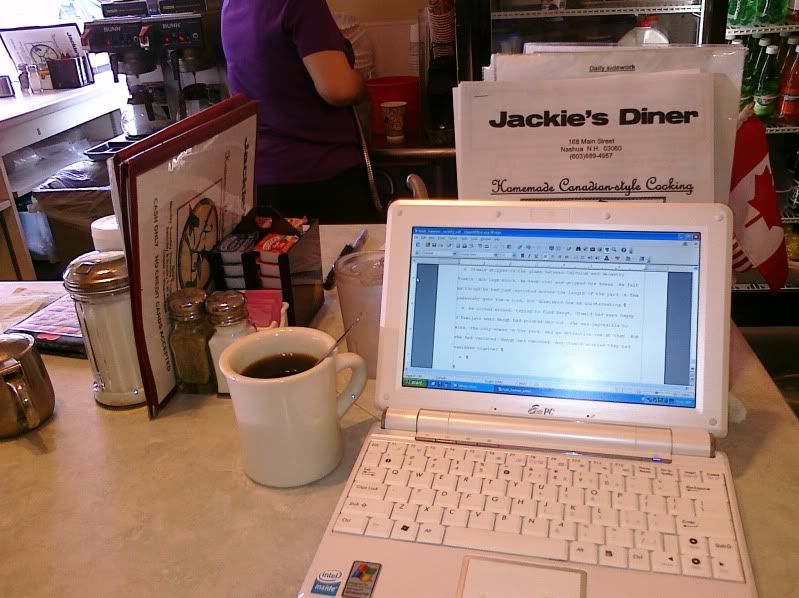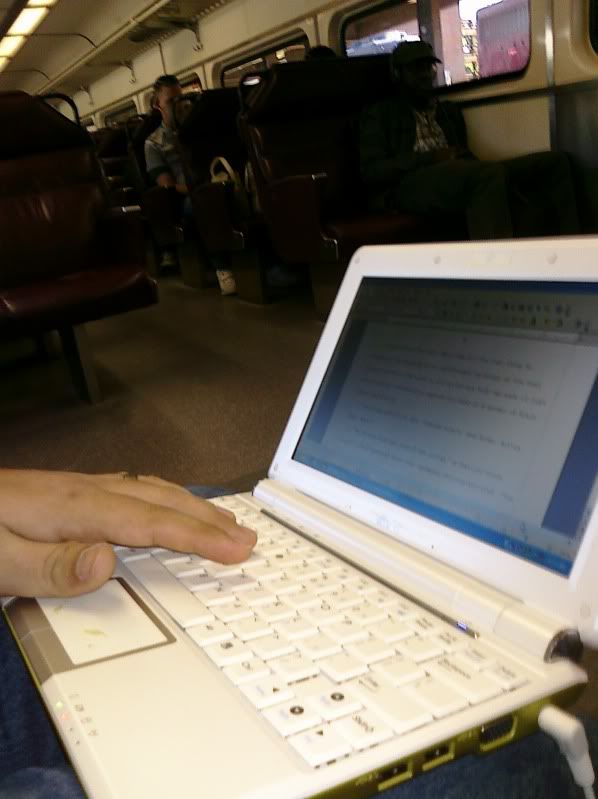Despite all that, an author asked me on Twitter to tell him what I think of his book when I was finished, and I can't do that in 140 words, so here it is, my first book review in this journal. Not to leave him out there by himself, I'm also going to review another book later this week. Two in one week! Two! It must be Christmas.
And so we begin. I recently read THE CITY'S SON by Tom Pollock. This is an urban fantasy, and I don't normally read urban fantasy. This is also a young adult novel, and I'm tired of young adult novels. It seems like that's all there is on the market, for the most part. So now that you know that, here are my opinions of the book:
Read it. It's a good book.
Boom. Review done.
Wait, I'm supposed to do more? Okay. Here's the general description: Set in modern-day London, there is a world-within-a-world, but not with fairies, vampires, or werewolves. This is a wholly new concoction of not-humans, which makes this the best urban fantasy I've read in years. YEARS! This is the kind of setting that gets turned into a role playing game and you get to play it for years and years until you forget that it was based on a book.
People live in the walls. People live in light bulbs and depending on what kind of light bulbs they are (phosphorus versus sodium) they may hate the other kind of light bulb person. Trainwraiths that remember their passengers, wolves made of scaffolding, and so on and so forth. It is AMAZING. The setting of this book is so awesome that I could give up the plot and just wander around marveling at the world beneath London.
Which also leads me to my first complaint. Much like Buffy, it is hand-waved away that normal people self-delude themselves if they're exposed to this world. They cannot accept it, thus they do not accept it. They forget or rationalize or in some other way dismiss what they've seen. Except for every human character we meet that actually interacts with them. One of the two main characters of the book is introduced to this world and NEVER EVEN BLINKS AN EYE. She rolls right into it like she's hanging out in Camden Market or something.
I had trouble accepting how readily the human characters interact with the other world, but you get over it just like the book does. It speeds along so you don't have time to think about that (which means you either keep reading and accept it or you stop reading, which I almost did, but I'm glad I didn't).
Speed along because there isn't just an imaginative setting, there's an imaginative history to that setting. You get to learn about the Pavement Priests (SO COOL!), the mother of the streets, the Chemical Synod (so cool, but the long Ses make me think they're speaking in parseltongue). The setting is cool, but so much cooler because of the people that make it up.
Which gets us to the people. Ups and downs here. There are the two main characters, boy and girl. Then there's the female main character's best friend. There was a little confusion for me at the beginning because the best friend's nickname is Pencil and THAT name gets truncated down to Pen. The thing is, I thought they both had nicknames, one was Pen and one was Pencil, so things got really confusing really quick. Once I realized that Pen was Pencil and only one had a nickname, it made more sense. I was also disappointed because I thought Pen and Pencil was a great way to describe their friendship in as few words as possible.
The relationship between Beth and Pen is the high point of this book. As personal interactions go, Pollock nails these two the best. It feels the most natural. It reads the most engrossing, and it feels the most realistic. Second is the relationship between Beth and her dad, which really hits its high point in the middle of the book when neither character are together. It really helps their individual arcs along, and I was a bit jealous at how subtly those arcs had their foundation lain in the early chapters with these two characters. That was some mighty fine character development.
The relationship between the two main characters, well, that was the inspiration for this post. Now that I've finished the book, my opinion remains the same. (The backstory of the male main character is pretty wicked as well, lest you think I am ignoring him.)
Speaking of previous posts inspired by the book, there is also this post. I almost quit reading the book because of the errors. And I'm not talking about "Oh no, that's not an error, it's a Britishism rather than an Americanism". I mean, there are errors. Words missing. Words included that shouldn't be (words included that shouldn't that be). ESPECIALLY at the beginning. It dies down after the beginning but never fully goes away. It's rampant at the beginning of the book and was driving me nuts. This suggests a number of possible options: the beginning of the book received the most revision closest to publication (such as editorial notes), thus was not edited as much as other parts of the book that remained the same. The publisher skimped on editing. Or the author is atrocious at self-editing and that was the best the publisher could do. I'm leaning toward the first option myself, as I want to give both the publisher and the author the benefit of the doubt. (Having worked in book production before moving on to media, I know how, why, and how often publishers skimp on editing to save time and money.)
But lastly, and why I'm over the moon about the book, and why it means so little to you whether you'll like the book, his voice is SO similar to my own. I wouldn't have written this book. I've never been inspired to write urban fantasy. But if you had told me that you were from the future and I had written an urban fantasy and you let me read this book, you might convince me. Word usage, sentence style, cadence. It all sounds like me. And that's not to suggest that my voice makes it superior. It is to suggest that there is HOPE! I have improved significantly over the last year. I've moved on to the next level, I think in my brain. I'm ready to do this! But I'm not doing this. I'm still doing that other thing, and that can make it hard to keep one's chin up. But seeing Tom's book out there, that really makes it feel like there are agents out there that resonate to the way I write (just not necessarily what I've written to date). (That Tom's agent is on my short list of agents I want to work with only sweetens that pot, it is not the cause for this adulation.)
A pessimist (like myself) might think that an agent finding that voice wouldn't want another author that sounds similar, but that sliver of optimism I have in there says, but Tom writes urban fantasy and I never ever write urban fantasy (and with less finality, I rarely ever think of young adult stories either). So let's do this! Regardless of my dominant pessimism or my slight optimism, the simple fact that someone with a voice similar to mine has found an agent and a publisher says that YES there are fish out in that sea, so I need to keep swimming or I'll suffocate and the other fish who aren't those fish will eat me and crap me out to be food for phytoplankton. No one wants that.
So, back to the short review, THE CITY'S SON is worth the cost and worth the read. You should give it a try. I quit books in the first chapter ALL THE TIME, and I made it through this one. That should speak for itself. And follow Tom on Twitter. He's good people.


